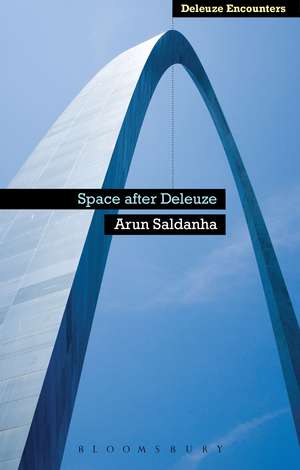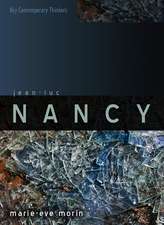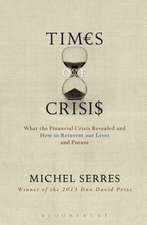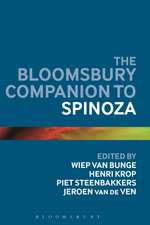Space After Deleuze: Deleuze and Guattari Encounters
Autor Dr Arun Saldanhaen Limba Engleză Paperback – 21 noi 2018
| Toate formatele și edițiile | Preț | Express |
|---|---|---|
| Paperback (1) | 237.10 lei 6-8 săpt. | |
| Bloomsbury Publishing – 21 noi 2018 | 237.10 lei 6-8 săpt. | |
| Hardback (1) | 771.75 lei 6-8 săpt. | |
| Bloomsbury Publishing – 19 apr 2017 | 771.75 lei 6-8 săpt. |
Preț: 237.10 lei
Preț vechi: 305.41 lei
-22% Nou
Puncte Express: 356
Preț estimativ în valută:
45.37€ • 47.50$ • 37.63£
45.37€ • 47.50$ • 37.63£
Carte tipărită la comandă
Livrare economică 10-24 aprilie
Preluare comenzi: 021 569.72.76
Specificații
ISBN-13: 9781441146632
ISBN-10: 1441146636
Pagini: 232
Dimensiuni: 138 x 216 x 16 mm
Greutate: 0.33 kg
Editura: Bloomsbury Publishing
Colecția Bloomsbury Academic
Seria Deleuze and Guattari Encounters
Locul publicării:London, United Kingdom
ISBN-10: 1441146636
Pagini: 232
Dimensiuni: 138 x 216 x 16 mm
Greutate: 0.33 kg
Editura: Bloomsbury Publishing
Colecția Bloomsbury Academic
Seria Deleuze and Guattari Encounters
Locul publicării:London, United Kingdom
Caracteristici
Explores current controversies surrounding Deleuze's legacy pertaining to questions of globalisation and difference
Notă biografică
Arun Saldanha is Associate Professor at the Department of Geography, Environment and Society at the University of Minnesota, USA.
Cuprins
Introduction1. Earth2. Flows3. Places4. MapsReferencesIndex
Recenzii
In Space After Deleuze, Arun Saldanha has produced an impressive synthesis of Deleuze's solo writings as well as his work with Félix Guattari . [A] a project of this nature has the potential to help students struggling to see how Deleuzian philosophy connects to geographic analysis.
Oceans are rising, atmospheres are warming, soils are changing, and the whole social world feels it's in slow upheaval. But as Saldanha writes, though the ground beneath our feet is always shifting, it is still a ground and not a bottomless abyss. Saldanha argues that it is a specifically Deleuzian kind of thinking that offers geographers the best tools to think through the complexity and messiness of our times, opening up rather than shutting down analyses, tending towards complexity rather than simple reduction.
Space After Deleuze is a brilliant and lucid account of the spatial thought of Gilles Deleuze and his sidekick Félix Guattari, that will delight and inspire geographers and philosophers alike. It will be essential reading for everyone who loves Deleuze, thinking, and space. But that's not all. For as a fossil fuelled and capital addicted humanity hell-bent on suicide continues to torture itself and the world, even the planet itself is screaming out for fresh thinking, a new people, and a new earth. By channelling the geo-communist spirit of Deleuze and Guattari, Arun Saldanha maps out a thinking space that is truly worthy of life on earth - a revolutionary geo-philosophy fit for the Anthropocene. Whereas Michel Foucault once quipped that "perhaps one day, this century will be known as Deleuzian" Arun Saldanha stunningly shows why the whole millennium will have been Deleuzian.
Space After Deleuze is a welcome invitation to rethink the very notion of 'space'. Arun Saldanha introduces students of space-geographers, architects and planners-to the geophilosophy of Deleuze and Guattari that is fundamental to this task. The book bravely turns a Deleuzian conception of the 'dynamic thickness' of space toward the most pressing social, political and (always) geographic issues of our age.
Oceans are rising, atmospheres are warming, soils are changing, and the whole social world feels it's in slow upheaval. But as Saldanha writes, though the ground beneath our feet is always shifting, it is still a ground and not a bottomless abyss. Saldanha argues that it is a specifically Deleuzian kind of thinking that offers geographers the best tools to think through the complexity and messiness of our times, opening up rather than shutting down analyses, tending towards complexity rather than simple reduction.
Space After Deleuze is a brilliant and lucid account of the spatial thought of Gilles Deleuze and his sidekick Félix Guattari, that will delight and inspire geographers and philosophers alike. It will be essential reading for everyone who loves Deleuze, thinking, and space. But that's not all. For as a fossil fuelled and capital addicted humanity hell-bent on suicide continues to torture itself and the world, even the planet itself is screaming out for fresh thinking, a new people, and a new earth. By channelling the geo-communist spirit of Deleuze and Guattari, Arun Saldanha maps out a thinking space that is truly worthy of life on earth - a revolutionary geo-philosophy fit for the Anthropocene. Whereas Michel Foucault once quipped that "perhaps one day, this century will be known as Deleuzian" Arun Saldanha stunningly shows why the whole millennium will have been Deleuzian.
Space After Deleuze is a welcome invitation to rethink the very notion of 'space'. Arun Saldanha introduces students of space-geographers, architects and planners-to the geophilosophy of Deleuze and Guattari that is fundamental to this task. The book bravely turns a Deleuzian conception of the 'dynamic thickness' of space toward the most pressing social, political and (always) geographic issues of our age.



































